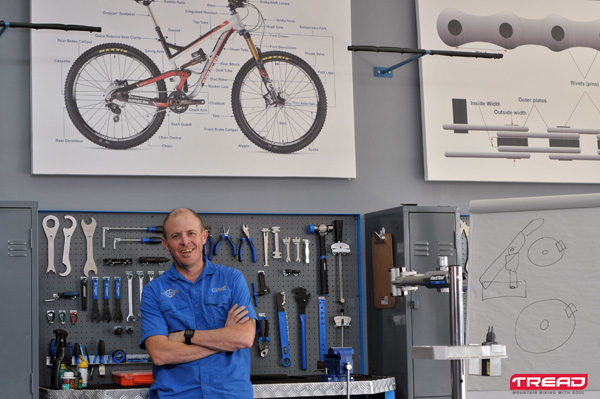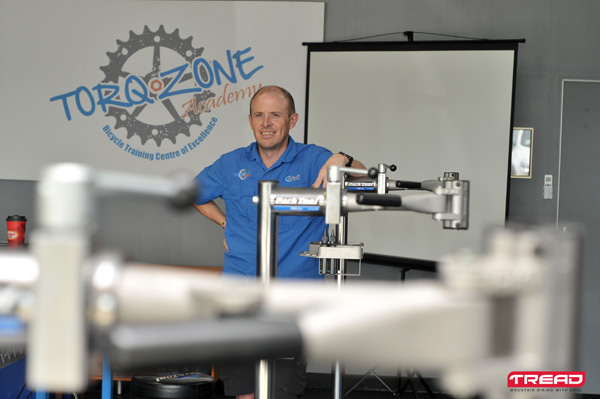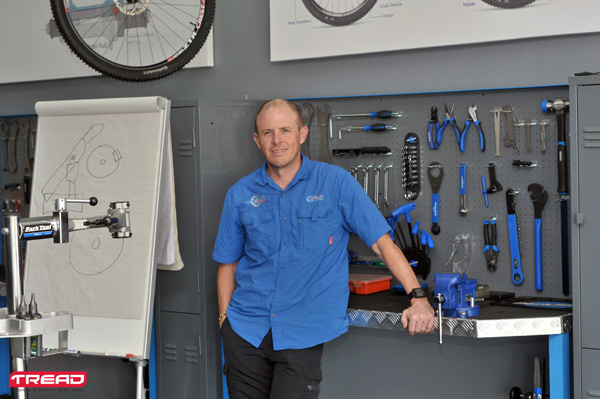We spend a lot of money on bicycles, ride them often, for long periods in all conditions and expect them to just work properly. But the reality is that the moving parts on bikes wear and need regular attention by trained professionals. Funny thing is, we tend to cringe at the cost of maintenance or repair when we collect our bikes from the local bike shop or maintenance centre. At that price, we expect them to ride like new. And a good service makes a bike ride like new. Sadly, we sometimes end up disappointed and back at the bike shop with a complaint; or, at another bike shop, hoping they’ll do a better job. The problem? A lack of properly trained bicycle technicians working on our bicycles in South Africa. – Sean Badenhorst
It’s been 12 months since the launch of the Torq Zone Academy Bicycle Training Centre of Excellence in Centurion. It’s the first – and currently only – South African-based, internationally approved bicycle technician-training centre, which was launched to specifically address this obvious weakness in the South African market.
We sat down for a beer with Graeme Stickells, co-founder and director of Torq Zone Academy and asked him some questions.

Has it been a successful 12 months for the Torq Zone Academy – are you content with the progress made?
I’m ecstatic with the progress of the Academy. Since opening our doors we have seen a steady increase in learner uptake, which shows very promising signs of continuing on that upward trend. The support shown by the South African cycling industry has been very encouraging.
What are the benefits to technicians achieving their Cytech technical certification?
The industry as a whole will benefit through better-trained technicians who are able to implement improved maintenance and repair standards at cycle shops. More specifically, however, the technicians benefit the most in that they now have recognition of their learning achievements which is verifiable, has personal and business value, and is portable both to further learning opportunities and in the workplace not only South Africa but in most parts of the world. With the international recognition of Cytech technical, I wouldn’t be surprised to see some of our learners go on to be technicians on professional cycling teams.
Give us some idea of what you have achieved so far as an Academy?
Our most critical milestone so far has been a successful Compliance and Quality Assessment visit by the Association of Cycle Traders (ACT) UK. The ACT are the owners of Cytech. Being the first Cytech accredited training provider outside of the UK this was especially rewarding. Cytech is quickly becoming the international training standard and is soon to be rolled out in some prominent Anglosphere countries.
Have you had bike shops investing in their staff and sending them to Torq Zone Academy training and upskilling?
Although we have received a large number of enquiries from cycle shops unfortunately the uptake by them is slightly slower than expected. Regardless, we are actively encouraging cycle shops to at least have one fully Cytech certificated technician per workshop. This technician can then take the Cytech training standards and disseminate them into the rest of the workshop and so ensure the upholding of practice standards, and workplace training and development.
Is there still a high incidence of bike shops employing workshop staff who aren’t entirely qualified to tackle some more difficult bicycle repair work?
I cautiously would answer yes and only because technician training has – up to now – largely continued through an informal, un-standardised means. I’m not by any means condemning this type training as there are and have been pockets of excellence.
What are the biggest challenges you have encountered in your quest to raise the standards of bicycle service/maintenance/repair to an international level?
To be honest although it has taken a lot of hard work the challenges have not been insurmountable. This has been especially made easy by the strong support we have received from the ACT UK and the local bicycle industry. Looking ahead, one of biggest challenges will be to educate the customer as to why they should start insisting on Cytech certificated technicians at their local cycle shop.

What is the minimum required level of school or education required for someone to attend a Torq Zone Academy course?
We prefer potential learners to have completed the National Senior Certificate (NSC) or any cognate qualification at that level. This does not however exclude someone not having achieved this level of qualification but who is able to read, write and speak English and who is enthusiastic in terms of their learning. To ensure a potential learner’s suitability to the occupation we have, in collaboration with an organisational development specialist, developed assessment instruments to test the suitability of the candidate. These instruments have proven especially useful with our “Adopt-a-Technician” programme, which in essence sees a patron sponsor the training of an individual unable to afford the training.
Can anyone attend a Torq Zone Academy Course – in other words, anyone that’s not currently employed in the bicycle industry?
The training is open to anyone regardless of whether they’re in the bicycle industry or not. However for the cycling enthusiast specifically we offer the Cytech home mechanic course where we essentially run through the basics of a bicycle and then show attendees how to conduct minor repair and maintenance.
There are three course levels, right? Can you briefly describe them and what each covers?
Yes, on the trade side we offer the Cytech Technical One, Technical Two and Technical Three certifications. We prefer the term ‘certification’ as this affirms the fact that the learner has been assessed to achieve the required competencies.
Technical One is the foundation training and includes a small theory component and a practical class component, which addresses frame alignment and preparation, and the pre-delivery inspection. Technical Two is really the core of the training where we cover all the major components of a bicycle and basic wheelbuilding. Technical Three is specialist MTB training where we cover the suspension system, hydraulic brakes, electronic groupsets and advanced wheelbuilding. For experienced mechanics wanting to achieve the certification, we have recognition of prior learning (RPL) assessments for both Technical Two and Technical Three.
Is being a bicycle mechanic/technician a viable career and what are the career opportunities for a new entrant into the industry?
I’ve no doubt that there is a career for a person who is willing to undergo the Cytech training and gain the necessary experience. Considering the relatively short training period a market entrant could, in a brief space of time, have quick access to sustainable employment. This could over time take them from being a greenhorn technician to a cycle shop manager or even owning their own cycle shop.
For more info on the Torq Zone Academy and Cyctech Technician training, visit www.torqzoneacademy.co.za
TREAD Magazine is sold throughout South Africa and can be found in: Spar, CNA, Exclusive Books, Discerning bike shops and on Zinio
*Originally published in TREAD Issue 37, Dec 2015 – All rights reserved




